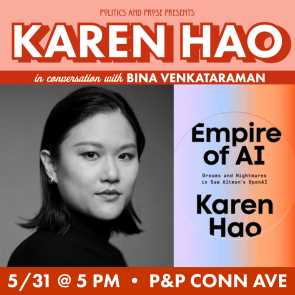
- This event has passed.
Empire of AI: Dreams and Nightmares in Sam Altman’s OpenAI
May 31 @ 5:00 pm - 6:00 pm

When AI expert and investigative journalist Karen Hao first began covering OpenAI in 2019, she thought they were the good guys. Founded as a nonprofit with safety enshrined as its core mission, the organization was meant, its leader Sam Altman told us, to act as a check against more purely mercantile, and potentially dangerous, forces. What could go wrong?
Over time, Hao began to wrestle ever more deeply with that question. Increasingly, she realized that the core truth of this massively disruptive sector is that its vision of success requires an almost unprecedented amount of resources: the “compute” power of high-end chips and the processing capacity to create massive large language models, the sheer volume of data that needs to be amassed at scale, the humans “cleaning up” that data for sweatshop wages throughout the Global South, and a truly alarming spike in the usage of energy and water underlying it all. The truth is that we have entered a new and ominous age of empire: only a small handful of globally scaled companies can even enter the field of play. At the head of the pack with its ChatGPT breakthrough, how would OpenAI resist such temptations?
Spoiler alert: it didn’t. Armed with Microsoft’s billions, OpenAI is setting a breakneck pace, chased by a small group of the most valuable companies in human history–toward what end, not even they can define. All this time, Hao has maintained her deep sourcing within the company and the industry, and so she was in intimate contact with the story that shocked the entire tech industry–Altman’s sudden firing and triumphant return. The behind-the-scenes story of what happened, told here in full for the first time, is revelatory of who the people controlling this technology really are. But this isn’t just the story of a single company, however fascinating it is. The g forces pressing down on the people of OpenAI are deforming the judgment of everyone else too–as such forces do. Naked power finds the ideology to cloak itself; no one thinks they’re the bad guy. But in the meantime, as Hao shows through intrepid reporting on the ground around the world, the enormous wheels of extraction grind on. By drawing on the viewpoints of Silicon Valley engineers, Kenyan data laborers, and Chilean water activists, Hao presents the fullest picture of AI and its impact we’ve seen to date, alongside a trenchant analysis of where things are headed. An astonishing eyewitness view from both up in the command capsule of the new economy and down where the real suffering happens, Empire of AI pierces the veil of the industry defining our era.
Karen Hao is an award-winning journalist covering the impacts of artificial intelligence on society and a contributing writer for The Atlantic. She leads the Pulitzer Center’s AI Spotlight Series, a program training journalists around the world on how to cover AI, and sits on the AI advisory board of the Craig Newmark Graduate School of Journalism at CUNY. She was formerly a foreign correspondent covering China’s technology industry for the Wall Street Journal and a senior editor for AI at MIT Technology Review. Her work is regularly taught in universities and cited by governments. She has received numerous accolades for her coverage, including an American National Magazine Award for Journalists Under 30. She received her B.S. in mechanical engineering from MIT.
Hao will be in conversation with Bina Venkataraman. Venkataraman is an American journalist, science policy expert, and author. She is currently Editor-at-Large for Strategy and Innovation and the inaugural Columnist of the Future at The Washington Post. From 2019 to 2022, she served as Editorial Page Editor of The Boston Globe, overseeing the news organization’s opinion coverage and editorial board during two presidential impeachment trials, the 2020 election, the COVID-19 pandemic, the death of George Floyd, the Capitol insurrection, and Boston’s historic 2021 mayoral election. During her tenure, the Globe had two Pulitzer finalists for editorial writing. She is the author of The Optimist’s Telescope: Thinking Ahead in a Reckless Age (Riverhead, 2019), named a top book by The Financial Times and a best book of the year by National Public Radio. Bina formerly served in the Obama White House as Senior Advisor for Climate Change Innovation, and she helped shape national policy on a range of issues from outbreak response to STEM education as the Director of Global Policy Initiatives at the Broad Institute for a decade and as a policy advisor to PCAST under President Obama. Bina has taught at MIT and the Harvard Kennedy School. She serves on the Advisory Board of Harvard’s Shorenstein Center on the Media, Politics, and Public Policy; on the Getty Museum’s PST ART advisory council; on the jury of the Goldsmith Prize for investigative reporting; and on the MIT Corporation’s Visiting Committee on the Humanities.
Can’t attend? Click HERE to join the livestream.

